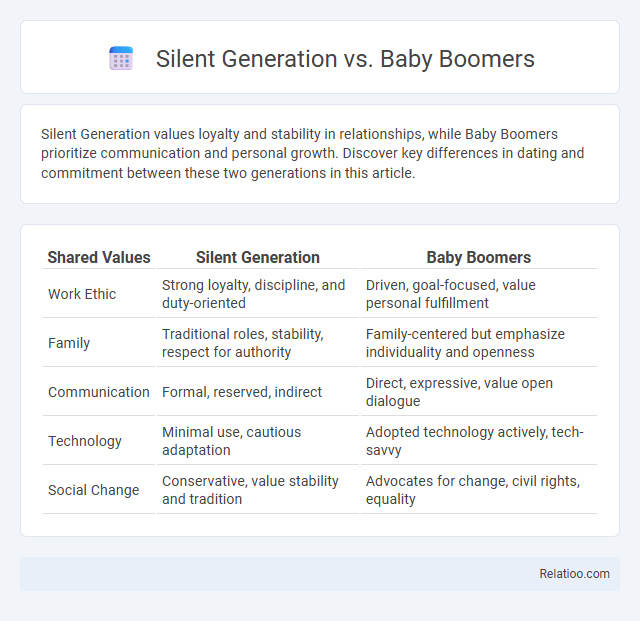Silent Generation values loyalty and stability in relationships, while Baby Boomers prioritize communication and personal growth. Discover key differences in dating and commitment between these two generations in this article.
Table of Comparison
| Shared Values | Silent Generation | Baby Boomers |
|---|---|---|
| Work Ethic | Strong loyalty, discipline, and duty-oriented | Driven, goal-focused, value personal fulfillment |
| Family | Traditional roles, stability, respect for authority | Family-centered but emphasize individuality and openness |
| Communication | Formal, reserved, indirect | Direct, expressive, value open dialogue |
| Technology | Minimal use, cautious adaptation | Adopted technology actively, tech-savvy |
| Social Change | Conservative, value stability and tradition | Advocates for change, civil rights, equality |
Introduction to the Silent Generation and Baby Boomers
The Silent Generation, born between 1928 and 1945, experienced a childhood shaped by the Great Depression and World War II, fostering values of discipline, loyalty, and caution. Baby Boomers, born from 1946 to 1964, grew up during post-war prosperity and significant social change, emphasizing ambition, consumerism, and individualism. These generational cohorts differ significantly in their cultural influences, work ethics, and societal roles, impacting communication styles and lifestyle preferences.
Historical Context: Shaping Events and Influences
The Silent Generation, born between 1928 and 1945, experienced the Great Depression and World War II, which instilled values of discipline and conformity shaped by economic hardship and global conflict. Baby Boomers, arriving from 1946 to 1964, were influenced by post-war prosperity, the civil rights movement, and the Vietnam War, fostering a spirit of activism and optimism. Understanding these historical contexts helps you grasp how pivotal events cultivated distinct generational attitudes toward work, social change, and authority.
Core Values and Beliefs
The Silent Generation values discipline, loyalty, and a strong work ethic, emphasizing conformity and respect for authority, while Baby Boomers prioritize ambition, individualism, and social activism, driven by the desire for personal growth and societal change. Generational differences highlight how each cohort's core beliefs shape attitudes toward work, family, and community, with the Silent Generation favoring stability and tradition, and Boomers embracing change and innovation. Understanding these distinctions helps You tailor communication and management strategies to effectively engage each generation based on their unique values and motivations.
Education and Career Paths
The Silent Generation, born between 1928 and 1945, typically pursued stable, long-term careers with a strong emphasis on formal education and vocational training, often valuing loyalty and job security. Baby Boomers, born from 1946 to 1964, experienced expanded access to higher education and diversified career opportunities, leading to increased professional mobility and a focus on personal achievement. In contrast, Millennials and Gen Z prioritize flexible career paths, continuous learning, and digital skills, reflecting shifts in the modern educational landscape and evolving economic demands.
Family Life and Social Structures
The Silent Generation values traditional family roles and stability, often emphasizing strong parental authority and long-term marriage commitment. Baby Boomers shifted towards more egalitarian family dynamics, with increased focus on dual-income households and active social engagement outside the home. Understanding these generational differences helps you navigate varying expectations around family life and social structures in contemporary society.
Communication Styles and Social Interaction
Silent Generation values formal communication and prefers face-to-face interactions, emphasizing politeness and respect, while Baby Boomers tend to favor direct, assertive communication and appreciate collaborative social settings driven by teamwork. Generational shifts show Millennials and Gen Z emphasize digital communication, favoring instant messaging and social media platforms for social interaction, blending casual tone with efficiency. Your understanding of these distinct communication styles enhances intergenerational dialogue and fosters more effective relationships across age groups.
Financial Attitudes and Retirement Trends
The Silent Generation values financial security and conservative spending, prioritizing savings and stable retirement plans, while Baby Boomers emphasize wealth accumulation, often engaging in diverse investments to enhance retirement income. Generational financial attitudes reveal Baby Boomers' tendency to delay retirement, reflecting market optimism, whereas the Silent Generation typically retires earlier with more cautious withdrawal strategies. Your retirement planning should consider these contrasting attitudes to optimize investment choices and income sustainability across different generational perspectives.
Impact on Politics and Society
The Silent Generation, born between 1928 and 1945, shaped politics with a focus on stability and post-war economic growth, influencing conservative policies and societal norms. Baby Boomers, born from 1946 to 1964, brought transformative social movements and increased political activism, driving civil rights, environmental reforms, and shifts in cultural attitudes. Your understanding of these generational impacts highlights how different age cohorts shape voting trends, political priorities, and societal values in distinct ways.
Technology Adoption and Adaptation
The Silent Generation, born between 1928 and 1945, tends to adopt technology more cautiously, often requiring user-friendly interfaces and clear benefits before integration. Baby Boomers, born between 1946 and 1964, show higher adaptability to digital tools, balancing traditional methods with emerging technologies like smartphones and social media. In contrast, Generations X, Y, and Z rapidly embrace innovative tech, driving trends in mobile connectivity, streaming services, and smart home devices through their early and frequent adoption patterns.
Legacy and Lessons for Future Generations
The Silent Generation is known for resilience, discipline, and duty, laying foundations of stability and conservative values that emphasize hard work and loyalty. Baby Boomers prioritize innovation, social change, and economic prosperity, fostering lessons in adaptability and pushing boundaries for civil rights and technology advancements. Future generations inherit a legacy of perseverance and progress, balancing respect for tradition with a drive for transformation in societal, environmental, and technological domains.

Infographic: Silent Generation vs Baby Boomers
 relatioo.com
relatioo.com